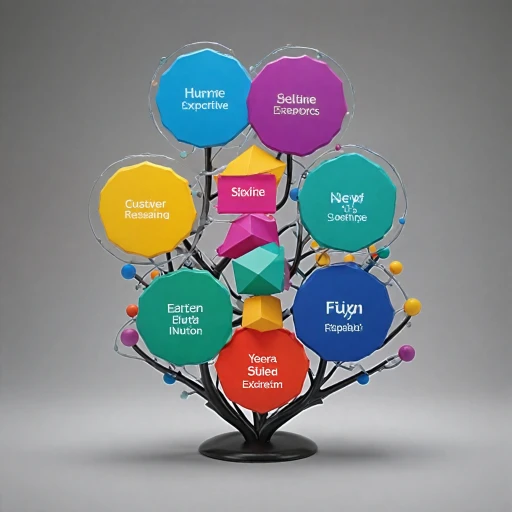
Understanding Talent Management System 2.0
What Makes Talent Management System 2.0 a Game-Changer?
In today's fast-paced business environment, organizations constantly strive to maximize their workforce's potential through efficient talent management systems (TMS). The dawn of Talent Management System 2.0 marks a significant shift, giving businesses a competitive edge by integrating cutting-edge technology. Talent Management System 2.0 isn't just a buzzword. It reflects a transformative evolution in managing talent, with a strong emphasis on being cost-effective and performance-driven. These systems seamlessly blend traditional human resources practices with advanced machine learning algorithms and data analytics tools. The enhanced data-driven approach allows organizations to refine their workforce planning and focus on succession planning and employee development efficiently. At the heart of this innovation lies powerful software capable of handling complex tasks ranging from employee onboarding to performance management. Such systems provide meaningful insights into recruitment trends and goal setting, aiding businesses in achieving high performance and aligning employee goals with organizational objectives. Additionally, these systems support ongoing learning and development initiatives reinforced by continuous feedback to foster employee engagement. An effective tool utilized by companies is to offer employees opportunities for career development, sharpening skills in areas that align with their individual goals and those of the organization. For businesses looking to stay competitive, investing in modern talent management solutions can greatly enhance the overall employee experience and drive performance. The era of Talent Management System 2.0 promotes a strategic partnership between technology and human resources to achieve success. To explore how personal strategy solutions can further enhance your workforce management, consider checking out the benefits of modern personal strategy solutions for Talent Management Systems.AI-Powered Recruitment
The Role of AI in Recruitment Processes
The evolution of talent management stems largely from the profound integrations of artificial intelligence within recruitment processes. AI has become an invaluable ally in refining and enhancing the recruitment journey, transforming how organizations approach talent acquisition strategically.
Leveraging AI in recruitment involves the use of advanced data analytics to sift through extensive databases, identifying the best candidates for particular roles with unmatched precision. The technology can analyze resumes, portfolios, and social media profiles, providing a more comprehensive assessment of potential employees. This streamlines the management system, enabling HR teams to make informed decisions efficiently.
AI-enhanced recruitment platforms also improve the candidate experience. Interactive chatbots are now commonplace in the initial stages of recruitment, providing immediate support, responding to queries effectively, and guiding candidates throughout the application process. This level of automation not only optimizes the workflow but also ensures a more engaging and responsive interaction.
Moreover, AI tools can identify patterns in previous hiring outcomes to continuously refine and enhance the talent acquisition process. By interpreting data regarding past hires, AI systems predict a candidate's likely performance, thus aiding in effective and strategic workforce planning.
A critical advantage of integrating AI into recruitment lies in its ability to minimize biases. Algorithms can be designed to focus on skills, experiences, and competencies, reducing the influence of unconscious biases that may occur due to subjective human perceptions. Nevertheless, it's essential that these systems are regularly monitored to avoid data-driven prejudice.
The incorporation of AI in recruitment processes is a testament to how seamlessly technology can achieve both cost-effective and high-performance recruitment objectives. With AI, organizations can better align their talent management efforts with their business goals, supporting both immediate and long-term workforce planning needs.
Further insights into this integration can be explored in this article on enhancing workforce management.
Enhancing Employee Engagement with AI
Unleashing AI for Holistic Employee Engagement
Employee engagement is an essential aspect of any thriving business, contributing to a productive and satisfied workforce. AI integration within talent management systems revolutionizes how organizations interact and engage with their employees, paving the way for innovative strategies that support greater involvement from their teams. AI-powered platforms can analyze a multitude of data points to identify patterns that might be invisible to the human eye. This allows businesses to personalize the employee experience and foster meaningful engagement by:- Feedback and Recognition: AI algorithms process employee feedback swiftly and offer instant recognition. This real-time interaction addresses employees' needs and acknowledges their contributions, nurturing a culture of continuous engagement.
- Career Development: By processing performance data, AI tools deliver insights on learning development opportunities tailored to individual career paths and aspirations. This ensures employees are not only developing but are on track to meet their personal and organizational goals.
- Goal Setting and Alignment: AI facilitates goal setting that aligns employee objectives with organizational business goals. This alignment ensures everyone moves in the same direction, boosting motivation and performance.
- Personalized Learning Paths: With predictive analytics, AI proposes personalized learning interventions that enhance skill sets in line with both existing capabilities and future requirements. This makes training and development more relevant and effective.
AI in Performance Evaluation
Leveraging AI for Employee Performance Reviews
In the evolving landscape of talent management, integrating artificial intelligence in performance evaluations is becoming increasingly essential. As organizations strive for optimal performance and employee development, AI-based performance management systems offer new ways to enhance accuracy, efficiency, and fairness in the evaluation process. AI can effectively streamline the process by analyzing large volumes of data related to an employee's work output, productivity, and overall contributions. This management software processes performance metrics, enabling managers to compare data with business outcomes and goal setting, ensuring that the organization's objectives align with individual achievements. Furthermore, AI-powered systems provide personalized feedback, supporting managers in delivering insights into areas of strength and opportunities for development. Employees are encouraged to engage in continuous learning and self-improvement, backed by data-driven insights, thus promoting greater employee engagement and high performance. The use of AI in onboarding performance and performance management not only aids in unbiased evaluations but also helps in identifying future leaders within the organization. Through pattern recognition, these systems contribute to effective succession planning by highlighting employees with high advancement potential. As we continue exploring AI's role in talent management systems, it's essential to address challenges and ethical considerations alongside harnessing its capabilities. When implemented thoughtfully, AI can transform workforce planning and career development, making it a cost-effective solution that elevates organizational success.Challenges and Ethical Considerations
Navigating the Complexities of AI Integration
Integrating AI into the talent management system of an organization presents a unique set of challenges that need careful consideration. While AI-powered recruitment and enhancing employee engagement with AI offer promising opportunities, they also highlight the nuanced task of balancing technological advancement with ethical practice. As AI becomes a staple in performance management and other HR processes, organizations must address the potential pitfalls.Data Privacy and Security: The utilization of AI in talent management requires the handling of vast amounts of employee data. Organizations must ensure that this data is managed securely and in compliance with privacy regulations. This is particularly important in recruitment and performance evaluation processes, where sensitive employee data is scrutinized. Failure to safeguard this data can lead to severe breaches of trust and legal repercussions.
Bias and Fairness: One of the primary concerns with AI and machine learning systems is the risk of inherent bias. AI systems are trained on existing data, which means any biases present in past decision-making processes can be perpetuated or even amplified. It’s critical for businesses to regularly audit their AI tools to ensure fairness and objectivity, thereby supporting diverse talent acquisition and an equitable management system.
Balancing Automation with Human Oversight: While AI can contribute significantly to efficiency in workforce planning and goal setting, human oversight remains essential. AI's role should be to augment human decision-making, not replace it. This balance is vital in roles like succession planning and employee development, where human insight and management talent are crucial to understanding the nuances of the organization's needs and employee potential.
Cost Considerations: Implementing AI-driven tools involves significant investment in technology. Organizations must evaluate the cost-effectiveness of these systems compared to traditional management software. A free demo can provide insight into the prospective return on investment and determine whether AI integration aligns with the company's long-term goals.
Employee Training and Adaptation: The shift to a more AI-driven environment requires employees to be adequately prepared and supported. Training programs focusing on how to interact with these new technologies can boost overall employee engagement and ease the onboarding performance process. An organization's success in this area often depends on proactive learning development initiatives.
These challenges are integral to fully harnessing the power of AI in talent management. A strategic approach that combines ethical frameworks, cost analysis, and human-AI collaboration will be key to navigating this evolving landscape.
Future Trends in AI-Driven Talent Management
Emerging Innovations and the Path Forward
The integration of artificial intelligence into talent management systems marks a pivotal shift in how organizations engage with their workforce. As AI continues to evolve, we find an increasing focus on enhancing the entire talent lifecycle from recruitment to succession planning.
Looking ahead, several trends are poised to reshape the landscape of AI-driven talent management:
- Personalized Employee Development: AI can tailor learning development resources and career development paths for individual employees, aligning with their personal goals and the organization's objectives.
- Advanced Workforce Planning: AI-enabled workforce planning tools offer precise data analytics to support strategic decision-making, ensuring businesses optimize their talent acquisition and management succession.
- AI-Enhanced Performance Management: The continuous feedback process is being transformed by AI, providing real-time insights into employee performance and enabling high performance through efficient goal setting.
While AI offers numerous benefits, organizations must remain cognizant of challenges such as ethical implications and data privacy concerns. It's crucial for businesses to implement transparent practices that build employee trust and ensure the proper use of AI.
The journey toward AI-enhanced talent management systems is both exciting and challenging. Organizations embracing these trends can anticipate a more agile, efficient, and engaged workforce, ultimately driving business success. As the technology advances, staying informed and adaptable will be key to leveraging AI's full potential in talent management.













